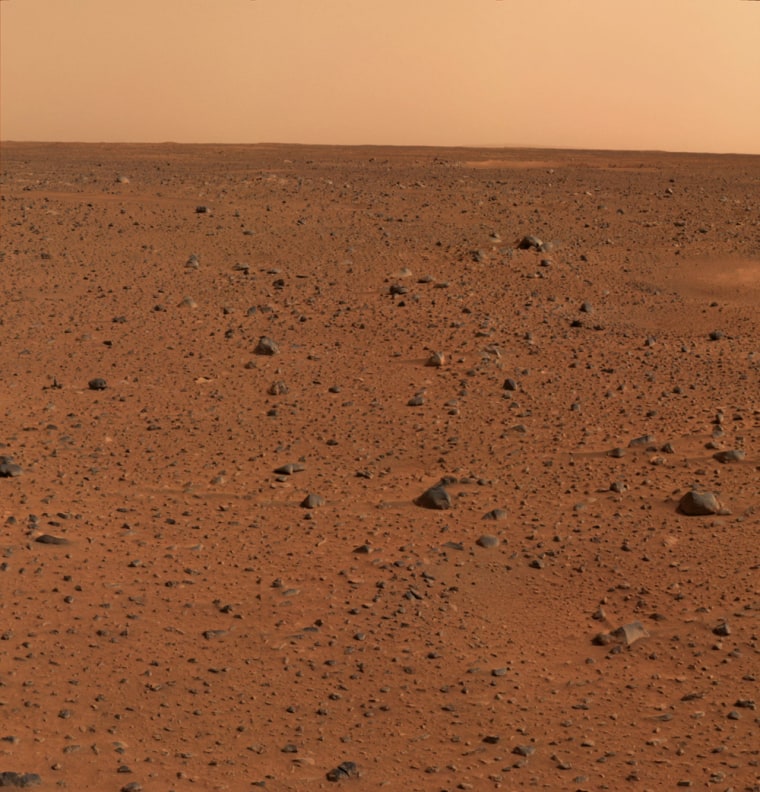I’m not one for conspiracy theories--okay, maybe I am occasionally--but the timing of President Bush’s new space initiative seems highly suspect. I don’t just mean its timing in relation to the pending election. I think we can all see that connection, as in, 'Wow let’s vote for the guy who is going to take us to the far reaches of the solar system and beyond!' (I’m sure there was a memo by some campaign advisor regarding this.) But I’m referring to a more sinister reason: A way to divert people’s attention from the sad prognosis of our planet.
In a paper published in the journal Nature, a consortium of researchers warns that even a minimal rise in global temperatures could lead to a massive die-off of plant and animal species. They estimate that one million species (between 15 percent and 37 percent worldwide) likely will disappear by 2050. Global warming is going to be our legacy, and our demise. Maybe I wasn’t paying attention, or I missed the sound bite, but did the White House ever comment on this sobering and painful prediction? I think not. Instead, right on the heels of it, the President released information about his new plan to establish a human colony on the moon and then, in the next decade, send people to Mars. It looks to me like a plan to just dispose of this little blue ball that we have so thoroughly trashed. The message: 'Don’t worry, children, we’ll be living on Mars before you’re out of college.'

I can’t claim to be totally innocent when it comes to our modern tendency of tossing things out--I’m as guilty as the next person of participating in this disposable culture. I’ve bought more than a few of those disposable cameras, I don’t always recycle gift wrapping paper, although I do try to do my best. And anyone who knows me knows I have a terrible reputation with paint brushes. All of my home-craft projects that involve painting a piece of furniture result in the purchase of a cheap brush that I toss into the trash when I’m done. Hey, cleaning a paint brush is time consuming. I’m not proud of this, I’m just trying to be honest. I’ve also been known to give up on a houseplant if it’s too infested with bugs; again, intensive care for a sick plant is time consuming.
But I draw the line at disposing of an entire planet. I could bring up the cost of a moon-Mars mission--according to the Associated Press, the ultimate price tag could exceed $750 billion--but it’s the underlying motive that I find most bothersome. Are we just going to give up on all those species that we are in the process of eliminating? It would seem so; it hardly seems like we have enough money to care for the Earth at the same time we’re colonizing outer space.
And then there are the images of Mars itself. Dirt, rocks, not a tree or a babbling brook in sight. From the past photos of moon landings, that place doesn’t look much better. The moon looks much more beautiful from right here on earth. Is the idea that, after a few years of wandering around in the dust, people will forget what a tree or a meadow looks like?
I am not trying to throw a damper on our curiosity about outer space, although I must admit it’s never ignited my daydreams…but isn’t living on Mars taking things a little too far?
I don’t want to live in a world without trees and forests, without elephants, tigers, great apes, migrating birds. I want vast seas where trawling nets aren’t slaughtering whales and dolphins, and where sea birds aren’t dying from ingesting pollutants. I want blue skies with no brown haze of smog. I want rain showers that are clean and healing, that saturate soil not turned toxic by chemicals we can’t even pronounce. If we really have all those billions of dollars lying around that can be spent on something, how about spending it on the earth? How about putting it into education so we can help future generations figure out how to pull us back from the horrible brink we are careening toward?
Consider the alternative: The vast and barren landscape of another planet and a future in which a child will ask, 'Daddy, what was a rain forest?' Worse, if we are on Mars, that child would ask, 'Daddy, what was rain?'
